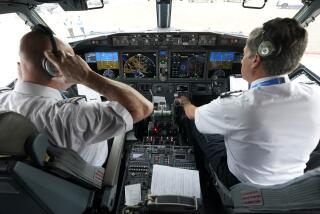Flying Tiger Pilots OK Concessions to Avert Sale
- Share via
Flying Tiger Line’s 650 pilots agreed on Thursday to massive wage and benefit concessions that are expected to prevent--at least for now--any sale of the struggling air cargo carrier.
The pilots accepted a 3 1/2-year package of concessions that includes a 25% wage cut--the largest ever in the airline industry--and a two-tier wage scale, under which newly hired pilots will be paid at lower rates. The pilots also gave up $8.4 million in yearly supplemental pension benefits and $10 million yearly in other benefits.
In return, the company said it will allow pilots to share in Flying Tiger’s profits and will grant employees one seat on its board of directors. The pact is effective Monday.
The agreement was reached after 3 1/2 hours of intense negotiation that began at midnight Wednesday after Sen. Alan Cranston and other labor and political leaders urged the Los Angeles-based airline to settle with pilots.
Flying Tiger, the world’s largest air cargo carrier, sought the concessions from pilots to help stem losses that have averaged $74,600 a day since 1981. Flying Tiger put itself up for sale last week, saying it would take bids on all its assets--including its 20 Boeing 747 jumbo jets and its valuable overseas landing slots--because it had been unable to reach an agreement with pilots after nearly four months of negotiations.
That announcement had an immediate impact on its business and at least one important customer, Japanese automobile maker Nissan Motors, switched from Flying Tiger to Emery Air Freight, a competitor, industry sources said. Nissan relied on Flying Tiger to ship automotive parts from Japan to the United States.
Lawrence M. Nagin, senior vice president and general counsel for Flying Tiger, said he hoped that the agreement reached with pilots would reassure customers. “We hope to stem that tide and move the company forward in a rebuilding effort,” he said Thursday.
Stephen M. Wolf, Flying Tiger chairman and chief executive officer, wasn’t available for comment on Thursday. A knowledgeable source close to Wolf said, however, that the company was likely to, at least, postpone any efforts to sell the airline.
Wolf intends to seek concessions next from the International Assn. of Machinists and Aerospace Workers, which represents about 2,000 employees. The airline employs 6,500, including about 1,000 in Los Angeles.
The negotiations with Flying Tiger pilots tested the reputation Wolf earned as an airline turnaround artist during his two years as president and chief executive of Republic Air. Wolf came to Flying Tiger in August after he turned Republic profitable by dropping unprofitable routes and winning three-year, 15% wage cuts from its employees. He sold Republic to Northwest Airlines in January.
Flying Tiger pilot negotiator Rick MacGibbon said Thursday that while the pilots were relieved to have reached an agreement with Flying Tiger management, they weren’t happy with its terms. “We’re not pleased with the agreement or the manner in which it was obtained,” MacGibbon said. Pilots felt as if the company had “held a gun to our head,” he said.
The pilots accepted the demands for concessions that Wolf had outlined in a letter to them on Oct. 24. The 25% cut will reduce pilots’ $117,000 average salary by $29,250, to $87,750. Pilot salaries range from $60,000 for domestic pilots who fly 727s to $180,000 for those who fly 747 jumbo jets on international flights.
Agreement Against Break-Up
MacGibbon said pilots did obtain an agreement to prevent a break-up of the airline. The agreement calls for their salary cuts to be restored if Flying Tiger reduces it business by more than half by selling assets such as planes or landing slots. Wolf said previously that the wage concessions were essential if the company was to refinance about $300 million of its $525-million debt to reduce its debt costs. The airline suffers from a heavy debt burden at a time when it faces stiff competition from other, lower-cost air carriers that entered the market after the industry was deregulated in 1978.
Flying Tiger has especially suffered from severe competition on its important Pacific routes from Nippon Cargo Airways, a year-old Japanese carrier, and to a lesser extent, from domestic carriers such as American and Delta, which recently expanded service to Japan. The Pacific region--in which U.S.-Japan business makes up the biggest part of Flying Tiger’s turnover--provided 50% of Flying Tiger’s 1985 revenue of $1.1 billion.
Expansion Expected
Ronald L. Burson, head of Flying Tiger’s pilots union, said that pilots received indications from management on Thursday that it intends to expand the airline to recapture some business, now that it has obtained pilot concessions.
According to Burson, company negotiators said the airline might acquire DC-8 cargo aircraft. Flying Tigers sold all its DC-8s, which served both international and domestic routes, in a financial crunch several years ago.
A knowledgeable source said that Wolf is considering the purchase of some or all of Transamerica’s seven DC-8 cargo planes, which that company has put up for sale. The fleet is valued at $148.6 million, according to Cargo Facts, an industry newsletter.
More to Read
Inside the business of entertainment
The Wide Shot brings you news, analysis and insights on everything from streaming wars to production — and what it all means for the future.
You may occasionally receive promotional content from the Los Angeles Times.










